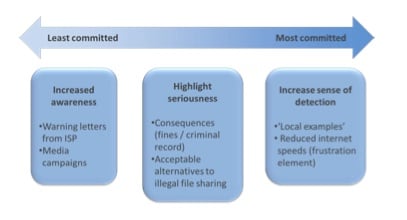This article is more than 1 year old
Ofcom grills pirates, loses report under fridge for two years
'Music, vids pirated because they're too expensive' shocker!
Onto the next survey: got an Attitude?
The other survey for Ofcom, GfK's attitudinal research, is much more recent - it's dated August 2011. It's drawn from interviewing 36 people in-depth - so it's a small sample size. GfK was offered a huge variety of reasons for piracy, ranging across demographics. "Self-serving consumers" grab unlicensed material because they can, often pulling down movies and TV shows before they get a UK release. "Collectors" and "cyber-techies" were more hands-on, and more aware that what they were doing was legitimate, but had more justifications for it - something in common with the older end of the demographic.
GfK quotes one under-30 male, who had a fairly sober and sensible assessment of the risks: "I'm under no illusions that you can be prosecuted for downloading stuff because it's kind of like fraud…piracy. The punishment seems to be outweighed by the rewards you get from doing it though, especially since no one ever gets prosecuted really."
Indeed; the greatest threat faced by a habitual copyright infringer is probably wrist strain.
GfK also found that "a small number of participants maintained that the record industry was ten years too late in trying to prevent people from file sharing":
They felt that when sites like Napster and Kazaa had begun, the industry had had a chance to develop high quality, legal file sharing sites that allowed the public to access music at a reduced rate. There was a feeling that if a file sharing application had offered paid-for, high quality content at low prices at this time then legal file sharing would not have taken off as people would have had access to good quality content without risking downloading viruses or other malicious code.
(That's a point made countless times by this reporter, and the industry did in fact quietly try to recruit P2P developers for such an experiment - something not many people know, but you can read about here.)
This part of the sample group concludes that "it will be very difficult to move people onto legal alternatives that require payment". This all depends on the quality of the legal alternatives, and a change in the risk. As GfK notes, the cyber-techies and collectors don't believe the music industry threats are credible:

The key hurdle in deterring this group is their scepticism about the likelihood of detection, and the difficulty in encouraging them to believe in the credibility of messages about this. This group would be likely to require evidence of effective detection and prosecution, beyond that which could be offered through traditional media campaigns. Measures such as highlighting of local examples would be more credible for this group. In addition, their strong reliance on technology would mean that penalties relating to their ability to access the internet would be strongly deterrent.
So we head into 2012 discussing two-year-old research - which the researchers admit can't really be used to generalise anything useful. (GfK says this explicitly, while Kantar says what people do and what people say they do rarely match - it is left guessing which answers are accurate.)
Well, chaps, here's an idea. Why not choose a representative sample of 2,000 broadband users, grant them immunity for a couple of months, and do a silent double-blind test? Perhaps with some of the sample you could experiment with new ideas. The ISP knows exactly what's going on, so speculating on speculation should become superfluous. ®
Further reading
Kantar: Illegal File-sharing Pilot Survey Report for Ofcom - May 2010 [PDF] GfK: Qualitative research into online digital piracy - August 2011 [PDF]
